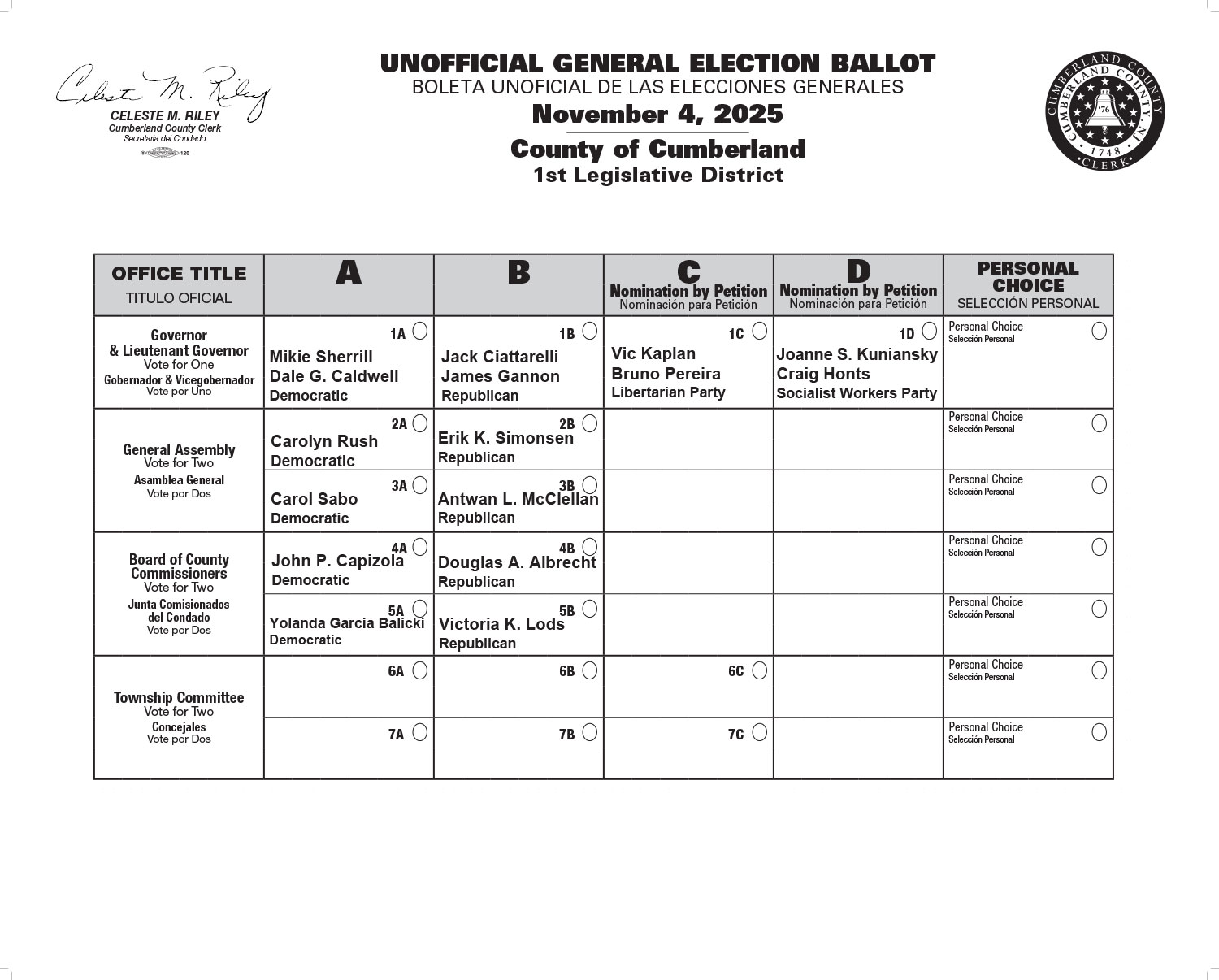Suggested Use of This Page
Learn More
- If this is your first time taking a close look at local politics, make sure you read about what the role of this office is.
- Read the quick election summary to get an overhead view of what is going on in the race.
- Review the issues related to the district and office which we've been able to identify
- Review the candidates on the Unofficial Ballot. Click on their names to learn more about them.
- Take a look at the official ballot to ensure you know exactly where your preferred candidate will be.
What does a General AssemblyPerson do?
Learn More
Description: A member of the New Jersey General Assembly serves in the lower house of the New Jersey State Legislature. Together with the State Senate (the upper house), Assembly members are responsible for shaping state laws and overseeing matters that affect residents across all municipalities, not just one town or city. Here are the key responsibilities of an Assembly member:Statewide Legislative Responsibilities: Assembly members draft, propose, and vote on state laws that apply to all of New Jersey. These may include bills on education, healthcare, public safety, infrastructure, civil rights, and economic development. Unlike a township committee member, who deals with local ordinances, Assembly members help shape laws that set statewide policy.
Budget Review and State Funding Decisions: Members of the General Assembly help review and approve the state budget proposed by the Governor. This includes decisions on how much funding is allocated to education, transportation, law enforcement, environmental programs, and aid to municipalities. They play a key role in determining where taxpayer money goes at the state level.
Constituent Advocacy: Assembly members represent the people of their legislative district—which includes multiple municipalities—and act as a bridge between local concerns and state-level solutions. They help constituents navigate state programs, respond to policy concerns, and advocate for legislation that addresses district-specific needs.
Checks and Balances: While the Governor has executive power to enforce laws and manage state agencies, Assembly members serve as a legislative check on the Governor’s authority. They can override a Governor’s veto (with enough support), conduct hearings, and introduce new legislation that counters or refines executive actions.
Oversight and Accountability: Assembly members may serve on committees that investigate government agencies, hold hearings on state policies, and evaluate how effectively programs are implemented. This role helps ensure transparency and accountability throughout the state government.
Collaborative Lawmaking: Assembly members work with fellow legislators—including State Senators—to pass laws. Most legislation must pass both houses (Assembly and Senate) before reaching the Governor’s desk for final approval or veto. Assembly members often sponsor or co-sponsor bills, building coalitions across party lines or interest groups.
Quick Election Intro
Learn More
This November, voters in Legislative District 1 will decide who fills the district’s two Assembly seats, covering all of Cape May County and parts of Cumberland and Atlantic counties. Mail-in ballots have already been sent out, and the first gubernatorial debate of the season took place last Sunday—setting the stage for the home stretch of this election cycle.
All four Assembly candidates—Republicans Antwan McClellan and Erik Simonsen, and Democrats Carolyn Rush and Carol Sabo—have presented updated websites and completed radio interviews with InformTheVoteNJ. This level of participation reflects the kind of baseline transparency and accessibility that should become the standard for local races. Each has also agreed to follow-up conversations, so there is opportunity for voters to see a deeper comparison of priorities and plans as the campaign continues.
Carolyn Rush should be acknowledged for being the first to step up this year with a full 2.5-hour podcast alongside her then ticket-mate Brandon Saffold during the primary season. That interview and her radio interview remains one of the most pressing on this platform to date and sets a benchmark for long-form voter engagement. As a one-person operation, pressing each of the other candidates for equally detailed follow-ups will take time and planning, but the opportunity is there and will be pursued thoughtfully.
At this point in the election cycle, anything can still happen. Campaigns can ramp up or fall off. New issues can surface. Promises of transparency can become reality—or remain just that: promises. InformTheVoteNJ will continue working to provide consolidated, accessible information so that voters in Cumberland County and the rest of LD-1 don’t have to navigate it all alone.
Legislative District 1 Issues
Learn More
Issue 1
Issue 2
Issue 3
Unofficial Ballot
Learn More
GENERAL ELECTION DATE: November 4th, 2025
UNOFFICIAL BALLOT
Below is not exactly what you'll see sent to your house or in the voting booth, only an approximation based on website design considerations and focus on specific races. Please review the official ballot beneath the unofficial ballot before voting.
( Click or tap on candidate name to learn more about them )
General Assembly
DEMOCRATIC
DEMOCRATA
OFFICE TITLE
TITULO OFICIAL
A
Democratic
Democrata
B
Democratic
Democrata
PERSONAL CHOICE
SELECCION PERSONAL
General Assembly
Vote for Two
Asamblea General
Vota por Dos
Personal Choice
Seleccion Personal
REPUBLICAN
REPUBLICANO
OFFICE TITLE
TITULO OFICIAL
A
Republican
Republicano
B
Republican
Republicano
PERSONAL CHOICE
SELECCION PERSONAL
General Assembly
Vote for Two
Asamblea General
Vota por Dos
Personal Choice
Seleccion Personal
Official Ballot
Learn More
